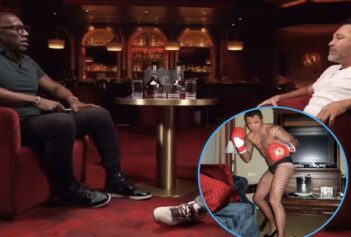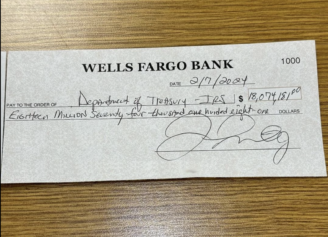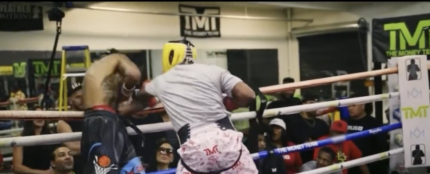Before Mayweather vs. Pacquiao set world records for pay-per-view, the original blockbuster card was the matchup between the Golden Boy Oscar De La Hoya and the newly minted Money Mayweather.

The fight was historic for a few reasons, all of which set a tone for the future of boxing.
It was the first time that the new Money Mayweather persona was unleashed upon the world. Replete with excessive cash-throwing, brash appearances and extreme trash talk, Floyd decided that the art of polarization, in addition to his supreme boxing skills, would propel him to superstardom.
The strategy was in direct conflict with his former promoter Bob Arum, who only understood how to promote the good guy image. Hence, the perfect marriage between the Olympic Gold Medalist in De La Hoya and the rags to riches Filipino story of Manny Pacquiao synched well with Arums Top Rank Promotions.
Mayweather exuded more of a street edge based in urban culture and wanted to control the narrative throughout. Gone was Pretty Boy and it was the last time Floyd Mayweather would ever be the B-side of any fight in his career ever again.
Before his monumental move to Showtime, Mayweather was still on HBO and this was the first time the legendary 24/7 series would be unleashed on the world before the fight. The four-part prelude gave a slick glimpse into the pre-fight lifestyle, thought process and insight on the two stars in a way that had never been done before.
The HBO cameras captured the infamous argument between Mayweather and his father, exposing a still-hurt son that rejected his dad and belittled his boxing accomplishments. Mayweather, Sr., then sought to be the head trainer for De La Hoya, and was rejected after quoting a price of $2 million to give the Golden Boy the secret to beating his son.
Instead, Freddie Roach was hired for a flat rate of $1.3 million dollars, branding all the players as gritty, reality TV superstars.
The fight took place at the MGM Grand Garden Arena in Las Vegas, Nevada under the banner of Golden Boy Promotions. The arena would later become the official home for every Mayweather fight to come. The bout was contested at 154 pounds, a higher weight for Floyd who was the 147-pound champion, with De La Hoya defending his WBC light middleweight championship won by defeating Ricardo Mayorga via TKO one year earlier.
Tickets were priced at $2,000, $1,500, $1,000, $750, $350 and $150 and sold out within three hours, generating over $19 million in live gate revenue. That beat the previous record of $16,860,300 set by the 1997 heavyweight championship rematch between Evander Holyfield and Mike Tyson at UNLVs Thomas & Mack Center.
The betting odds were erratic as Mayweather was a 2-1 favorite when the fight was made. But a lot of money poured in on De La Hoya, and Mayweather was a 3-2 underdog by fight time.
De La Hoya was the aggressor throughout the fight, and he managed to get through his opponent’s slick defense in the early rounds as Mayweather moved away and counterpunched without great effect. Every time Mayweather went near the ropes, De La Hoya tried to trap him there and land a flurry of punches to the body and head.
De La Hoya wanted a brawl, but Floyd was content to pick his spots and land counter-punches. In the fifth round, however, the fight seemed to shift gears as Mayweather stood his ground and landed some hard combinations to the head.
Mayweather’s trainer and uncle, Roger, said in the corner, “He’s getting tired. He’s getting tired,” reiterating his pre-fight sentiment that De La Hoya would fade as the fight went on. And his prediction seemed on point.
Two judges gave Mayweather four of the last five rounds, making the difference in what turned out to be a closely scored fight. Mayweather won by a split decision, capturing the World Boxing Council (WBC) title. Judges Jerry Roth scored the fight 115-113 and Chuck Giampa 116-112, both for Mayweather. Judge Tom Kaczmarek had De La Hoya winning, 115-113.
De La Hoya landed 82 of 341 power punches (24 percent), and Mayweather landed 138 of 241 (57 percent). De La Hoya connected on 122 of 587 total punches (21 percent), and Mayweather connected on 207 of 481 (43 percent).
The fight set the record for most Pay-Per-View’s for a boxing match at the time with 2.4 million households buys, beating the previous record of 1.99 million for Evander Holyfield-Mike Tyson II. Around $136 million in revenue was generated by the PPV, which was surpassed in 2015 by Mayweather vs. Pacquiao. That fight generated more than $400 million from 4.6 million households in PPV buys.
If it wasnt for the historic pairing of De La Hoya vs. Mayweather, the most lucrative fight in history and one of the most lucrative sporting events of all time, the fight with Pacquiao, would have never happened.
Factoring in the percentages, Oscar De La Hoya ended up earning $52 million, the highest purse ever for a fighter. Floyd made $25 million with the previous record of $35 million by Tyson and Holyfield now broken.
Mayweather sustained the high-level PPV game and then destroyed the model with the most highly watched fight in history with Pacquiao. Still, the significance of the fight between De La Hoya and Mayweather will go down in history as the catalyst for boxings resurgence.



